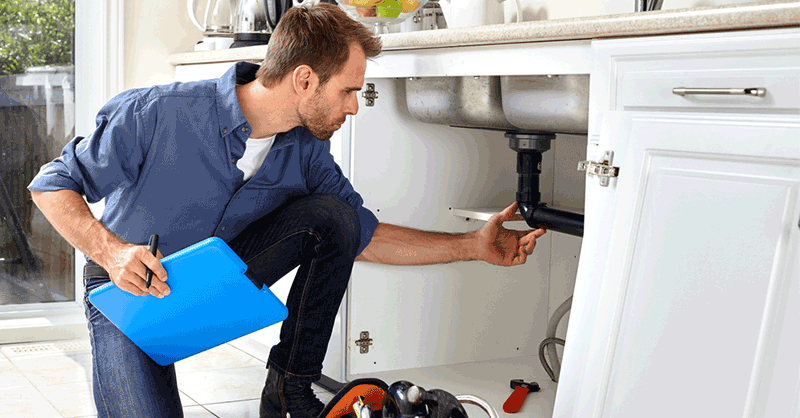A career as a tradesperson such as a plumber can be a very rewarding one. Specially if you enjoy handling tools and working with friendly people. Helping others by fixing things with your own hands and earning a generous living can be an absolute treat for your mind.
The path of becoming a tradesperson requires hands-on experience that needs both education and training. But the inspiring thing is that here in the UK we never had enough plumbers to go around with. So plumbers are always in demand. The demand for plumbing services won’t even go out even in the period of a recession or a slow economy as this is a very essential service.
So, along with job security and assurance of a steady income you will also get the satisfaction of fixing things with your own hands, seeing results and making people happy with your own hard work. Summing all these things up a plumber is guaranteed to enjoy peace of mind and earn a healthy living.
If you have already made up your mind to take up plumbing as your career but still confused about how to start off with or in doubt where to start. Don’t worry, you are in good hands. We have got your back. We are going to help you get set for this journey.
Reading the full article on how to become a plumber and introduce you to the right path towards your new career as a plumber.
Table of Contents
What does a plumber do?
As much as it is rewarding a plumber’s job is just as challenging . So it is sure to test your physical,mental and analytical ability. So knowing a little more from before will give you an extra edge over you contemporaries and set you up with the proper mindset for this profession. Plumbing mainly involves
- install, repair and service of almost all sorts of plumbing equipment. These include water & gas pipe, drinking water systems, central heating systems, even waste disposal systems of toilets and kitchens.
-
They are also involved in installing plumbing fixtures such as bathtubs, sinks, toilet appliances, dishwashers and washing machines.
-
Plumbers are also involved in design and installations of water fountains in cities.
- Design of irrigation channels to carry out the job of watering the crops.
A hands-on job like plumbing will never go out of fashion.
Plumber Duties & Responsibilities
The responsibilities of a plumber are listed as follows
-
Installations of bathroom fittings such as taps, bathtubs, showers etc.
- Installation of washing machines and dishwashers.
- Inspecting chillers and air-con units for potential problems.
- Testing and repairing leaks in pipes.
- Usage of welding machines.
- Using hand tools such as pliers and power tools.
- Working on instructions based on blueprints and carrying out technical plans from drawings.
- Fixing radiation pipes.
- Maintaining health and safety measures at the workplace.
- Working with other professionals such as Architects, Civil engineers and Electric technicians.
What skill is Needed For a Plumbing Job?
The hands-on skills required to be an efficient plumber is as follows
- An understanding of the piping system, the kind of system required and how the connections are made on the basis of a variety of purpose and use.
- The ability to read blueprints and to have a basic idea of building code(both local and state standard).
- The methodology of inspecting, determining and troubleshooting an existing plumbing problem.
- As a plumber, you need to know the operation procedure of a welding machine and also the skills of basic carpentry may be needed.
Learn more:
1. What Qualifications Do I Need To Be A Plumber?
2. Plumbing Tools and Accessories for the Professional Plumber
How to Become a Plumber?
You will need to fill out the following checklist before you can qualify to become a plumber in the UK.
-
Complete your GCSE exams.
- Aged 18 or above.
- Sound knowledge of numerics and English language.
The traditional way of becoming a plumber or in general any tradesperson would take a very long time. A learner would require to seek apprenticeships from other local plumbers.
Even after gaining the apprenticeship it would take a lot of time investment and a lot of hands-on experience for an apprentice plumber to operate on his own.
So apart from gaining apprenticeships another way of gaining fast track access to a career as a plumber is to complete an online plumbing course and gain fast track knowledge on the basics and also the interactive hands-on knowledge of this trade.
Why you should choose an online course before Apprenticeships?
Save time
It goes for without saying that an online course will place you in a much better position in terms of time compared to an apprenticeship. Enrolling into an online plumbing course will get you a much head start than an apprenticeship which will require at least 3-4 years to start paying off for your time invested.
Dedicated teachers
In an apprenticeship, the aspiring apprentice is less likely to pay any heed to the aspiring apprentice as most of the time he will need to concentrate on his own job. So getting dedicated teachers will give you a much better output.
Learn faster
Generally speaking, if you are provided with expert teachers you are going to learn much faster than looking over the shoulder of an expert plumber. Rather you require a lot of time just to figure out what he is doing.
The process of intensive learning is much more effective and produces better results. We have even observed it in our students. Students who had taken course hours before taking up apprenticeships normally perform far better.
Plumbing as a job may always be in demand. The way to get into this profession is very competitive. Apprenticeships nowadays mostly require coursework before you can finally appear for them.
Having a clear idea of the theoretical aspects of the job will give you a head start in your apprenticeship. You will get to make a proper assumption of what is being done by your trainer. This will also help you complete the apprenticeship within a very less time rather than starting from scratch with plumber training.
How hard is plumbing to learn?
The responsibilities of a plumber are numerous. It covers almost all of the domestic household items which includes installing bathroom fittings, water & gas pipe, drinking water systems, central heating systems even waste disposal systems of toilets and kitchen.
A plumber may even need to cover electronics at times. Although none of these are rocket science and proper visualization skills of mechanical systems can help him carry out any job.
Besides, hands-on jobs like plumbing are easier to learn than to describe. Skills learned upfront once are never forgotten even after years.
The bottom line of being a plumber is you will need to be strong and in good health, as the job is a physically challenging one. You will need to contort your body and work in uncomfortable positions and dirty environments. But within this comes the you of fixing things with your own hands and seeing results of your work first hand. Nothing can compare to the feeling of solving a problem successfully after a hard day’s work.
Plumber jobs and career path
There is no official license required to operate as a plumber in the UK. Upon completing the plumber course you should try out to get a short term apprenticeship to get yourself up and running with your job. The national career service’s website can be a helpful way for you to find an apprenticeship if you are short of contacts in this field.
After completing the apprenticeship and gaining the required field experience you can start off on your own as an individual serviceman.
You can get registered with a plumbing contractor to get jobs on a contractual basis and include yourself into large scale projects. This will be very helpful for you to get valuable experience.
You can also enlist yourself in the local plumber directory to make your service available to more people. You must also enlist yourself on yelp as people are now much more reliant on the internet for these types of services.
You should also attempt to get associated with the professional bodies involved in this field and increase your contacts. Like the Chartered Institute of Plumbing and Heating Engineering (CIPHE). You can associate with multiple professional bodies if you wish to.
The main services that a plumber provides are mainly installation, service, replace and fixing of household and commercial appliances. The job of a plumber is quite important to this extent because a family or a business cannot go without the service of a plumber when it is needed. It would get hard for them to operate when anything gets out of order.
The job of a plumber is a continuous learning process. Even the most experienced of the plumbers learn something new every day that gets added to his tally of experience. To be efficient at work you always need to keep a growth mindset and pick up everything that comes your way.
You also better try to be updated on the current market situation. The new tools that are surfacing and their uses. As a plumber, you must always be in touch with all the new training available online to upgrade your attributes in order to earn more out of your day work.
How much money does a master plumber a year?
Plumbers work on a project basis and are paid hourly on the type of work they perform. Average plumbing salary in the UK is about £30,000 annually. Some city plumbers earn up to £50,000 annually. Wages increase with more experience and type of work performed.
Recent posts
- The Impact Of Remote Work On Women In The Marketing Industry
- 5 Reasons Why You Should Pursue a Cybersecurity Career
- Differentiating Web Design and Web Development
- Top 10 Social Media Management Tools for Businesses in 2024
- Why is Child Development so Important in Early Years
- Line Management: How to be a Good Line Manager?
- How Long Should a Health Sector Career Take?
- The Importance of BSL in Everyday Life
- Why Corporate eLearning is Essential for Organisational Training
- Take your Business Expertise to the next level: Get your MBA







 April 03, 2020
April 03, 2020








